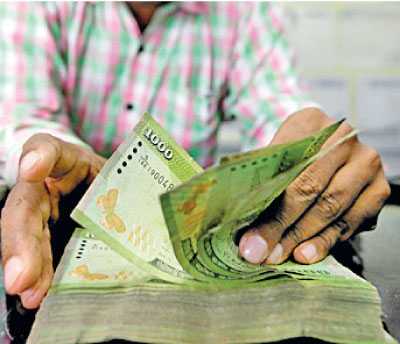Sunday Feb 15, 2026
Sunday Feb 15, 2026
Friday, 29 January 2021 02:18 - - {{hitsCtrl.values.hits}}
 The USD/LKR rate on spot contracts appreciated on Wednesday to close the day at Rs. 192.25/193.00 against its previous day’s closing levels of Rs. 195.50/196.50.
The USD/LKR rate on spot contracts appreciated on Wednesday to close the day at Rs. 192.25/193.00 against its previous day’s closing levels of Rs. 195.50/196.50.
Wealth Trust Securities said the appreciation was on the back of continued selling interest by banks. Last week the USD/LKR rate on spot next contracts was seen depreciating further to close the week at Rs. 196.50/198.50 against its previous weeks closing level of Rs. 193.00/195.00 on the back of continued demand by banks.
The more demanded spot contracts traded at level of Rs. 196.00 to Rs. 197.50.
As of Tuesday 26 January, the Rupee had depreciated by 6%.
On Wednesday, Money, Capital Markets and State Enterprise Reforms Minister Nivard Cabraal told journalists that he believes the Rupee should be at around Rs. 185 against the US dollar.
“Considering the macro economic situation no one needs to be unnecessarily concerned, and we wish to advice our exporters to convert their earnings into rupees. We must embark on this journey together during this difficult time. If any-one tries to rock the boat, it affects everyone in it. We can still steer this boat. But if anyone still tries to rock the boat, we will have to take measures to control them as the Central Bank is doing now,” he said.
Providing context to his standpoint, Cabraal noted that in 2014 the rupee was Rs. 131 against the dollar when the then Government was charged with controlling exchange rates instead of allowing a float. However, with the Yahapalana government taking over, the rupee had depreciated as much as 6.7% annually to end at Rs. 181.63 during a period of no global economic turmoil, he said.
Cabraal added that with the advent of the current administration, the rupee has only depreciated to Rs.186, or 2.6%, at the end of the 2020, despite a global economic slowdown due to the pandemic. In addition, the Central Bank was able to buttress reserves by a further $ 282 million, Cabraal said, and “ensured the entire economy was not put in jeopardy”.
Speaking further he noted that Sri Lanka is not considering issuing any new International Sovereign Bonds in the near future but that the country has made progress on swap arrangements with India and China, which would be finalised soon.
Cabraal said that when he stepped down as Governor of the Central Bank in 2014, the country had issued $ 5 billion in sovereign bonds at 5.71%, but by end 2019 the country had issued over $ 15 billion in bonds at a rate of 7.35%, adding over Rs. 170 billion in debt payments to state coffers.
Despite this, Cabraal said Sri Lanka was still in a good position to issue International Sovereign Bonds to raise money, but it has chosen instead to balance its foreign-to-local debt ratio which is skewed heavily towards external markets.
